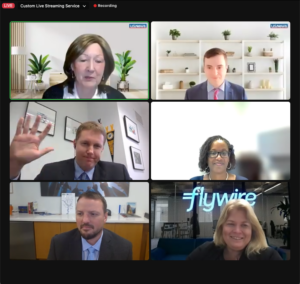Oglethorpe University Director of Financial Aid Chris Summers ’03 participated Sept. 27 in a national webinar titled “Solving the Higher Education Affordability Gap Through Technology and Innovation.”
The session was designed to explain how financial aid works, avoiding accumulating excessive student loan debt, approaches college take to inform families and technological innovations that are changing the way higher education is tackling the financial aid challenge.
Providing the independent college perspective on the panel, Summers gave voice to practical steps families can take to avoid the financial burden of paying for college. He also spelled out how earning a college degree continues to be a good investment for a person’s career earnings.

Chris Summers, director of Financial Aid at Oglethorpe, waves to the camera after being introduced as a part of the U.S. News & World Report webinar on financial aid and technology on Sept. 27.
“I spend a lot of time thinking about how to help students and families understand the nuances of financial aid,” Summers said. “Finances in higher ed is a very dense subject, and the students who need information the most sometimes can’t find it or don’t understand it.”
Sponsored by the global payment platform Flywire, speakers included Sharon Butler, executive vice president of Global Education at Flywire; Justin Draeger, president and CEO of the National Association of Student Financial Aid Administrators (NASFAA); Capri Harston, University Bursar at Tennessee State University; and Summers. The webinar was moderated by Michael Morella, managing editor of U.S. News & World Report.
Summers, an ’03 graduate of Oglethorpe, has worked in financial aid for the past 13 years and has been with Oglethorpe for more than 20. He is familiar with all the stages of the life cycle of a student, and offers guidance on the basis of experience and keeping up to date with the changes occurring on an annual basis, including the recently introduced federal SAVE Repayment Plan for student loans.
“We are absolutely recommending any and all students we are in touch with to look into the SAVE Repayment Plan,” Summers said. “And we encourage families to use the federal student loan repayment simulator and select the plan that works best for them. The SAVE plan is a major change. In a way, it’s a slow form of student loan forgiveness.”
Summers said the way he has seen technology impact financial aid most directly is communication. The new tools allow students to access repositories of information as well as receive what institutions are able to send to them directly through email and other platforms.
“By and large we want our students to come to us and talk to us person-to-person, but we can’t talk to everyone,” Summers said. “Technology is a way we can communicate with our students. We would like our students to be able to pull more information than just what we push to them. Even at a small school that thrives on interpersonal interaction, the technological innovations have allowed us to reach more students.”
He also addressed the recent trends in questioning the value of a college degree in the face of student debt. Summers stressed that the research still clearly shows a college degree has significant impact on people’s earnings over the course of their careers.
“I think about this question in terms of human capital,” Summers said. “Students who are enrolled in college and earning a degree are going to earn more over the course of their lifetime. Students now are thinking very hard about the first years after college and how much they will be earning compared to what they will owe, but this is a long-term investment. The sooner they can get into college and complete their degree the longer they will have to reap the financial benefits.”
Summers encouraged students to continue to fill out the Free Application for Federal Student Aid (FAFSA) each year even if they know they will not qualify for federal need-based aid. Filling out FAFSA allows Oglethorpe to see what their individual situation is and informs the university’s ability to provide assistance.
The form is changing soon, and Summers and his staff will be available to help students and their families prepare.
